


Some states also have a separate licensure process. Certification is often a requirement for continued employment (as well as advancement and optimum salary). Prospective employers may recruit actively on campus or send notifications of employment opportunities to the department to be distributed to students.Īfter graduation, students are eligible to take the national certification examination. Most of the students from the KU program receive employment offers by graduation or shortly thereafter. These concentrations will differ in the coursework and practicum taken during the last semester of the senior year (see curriculum for details). The last two years (beginning in August each year) of clinical coursework and practicum are taken in the metropolitan Kansas City area primarily at the University of Kansas Medical Center.ĭuring the senior year, students may choose to pursue the traditional clinical concentration or enter the molecular biotechnology concentration.
#Medical laboratory scientist jobs how to#
Students who complete their prerequisites by the end of the second academic year may apply for admission to the KU clinical laboratory science program (see How to Apply). If possible, “shadow” an MLS for a few days in a local hospital medical lab, area of research or industrial or forensic lab. We strongly recommended students seek advising from the department as soon as possible in their college career to get assistance in selecting appropriate courses and to minimize additional expenses and/or scheduling conflicts.Īnother step in learning more about what it takes to become a medical laboratory scientist (MLS) is to talk with someone who is a clinical laboratory scientist or medical technologist. Email or call 91 (711 TTY) to schedule an informational visit or personal tour of the KU Medical Center campus in Kansas City, Kansas. The KU Department of Clinical Laboratory Sciences is happy to help answer any questions. It provides an overview of the profession and all of its sub-specialties and is a good way to learn about a career in laboratory science. At KU, these classes are offered through the College of Liberal Arts and Sciences on the Lawrence campus and consist of traditional academic coursework such as a biology, biological sciences, chemistry and math.įor students already enrolled at KU, course CLS 210 is offered fall and spring semesters on the Lawrence campus. You may take the prerequisite coursework at any accredited post-secondary educational institution. The KU School of Health Professions, located on the KU Medical Center campus, offers a 2+2 accredited program culminating in a bachelor’s degree in clinical laboratory science. To become a medical laboratory scientist, students must enroll in an accredited program. Most community colleges offer these preparatory courses. Students who completed high school without the necessary math and science courses may need to take preparatory courses before enrolling in the standard college-level biology, math and chemistry classes. High school preparation should include as much math and science as possible – minimally biology, chemistry and physics and math through calculus. medical, biotechnology and industrial research laboratories.To provide high-quality, reliable analyses, laboratory professionals must have extensive knowledge of normal and abnormal physiology, correlation of laboratory data to specific diseases, and extensive knowledge of instrumentation and test principles and methodologies. Using state-of-the-art instrumentation and scientific methods, they provide laboratory results to clinicians and patients every day. They are healthcare detectives working behind the scenes. Many critical medical decisions that are life-changing are based on laboratory results generated by medical laboratory professionals. If you're looking for a science-based degree that prepares you for advanced studies and a career path that develops skills and experience useful in a variety of employment settings, then clinical laboratory science may be a good choice for you!Ĭlinical laboratory science (also known as medical technology or medical laboratory science) is a biology/chemistry-based degree that prepares students for exciting, challenging and dynamic careers. Do you like solving puzzles and problems? Do you excel in handling multiple tasks? Do you like a fast-paced and challenging environment?


 0 kommentar(er)
0 kommentar(er)
